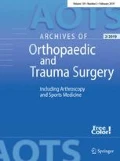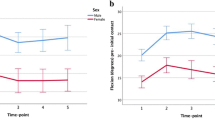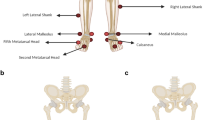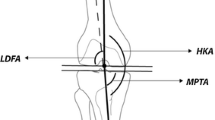Abstract
Introduction
Although numerous studies have demonstrated the relationship between maturation and lower extremity biomechanics during landing in team sport athletes, we are presently uninformed of any research that examined the single-legged drop landing biomechanics of gymnasts. The purpose of this study is to investigate the effects of the menarcheal age on the lower extremity biomechanics during a single-legged drop landing in female artistic elite gymnasts.
Materials and methods
Twenty-two female artistic elite gymnasts, between 9 and 36 years of age, participated in this study. The participants were divided into two groups pre- (n = 11) and post- (n = 11) menarche and asked to perform a single-legged drop landing on top of a 30 cm platform and land on a force plate. The statistical analysis consisted of the multivariate analysis with the level of significance set at p < 0.05.
Results
The post-menarche group showed a decrease in their maximum knee flexion angle and increase in their maximum knee abduction angle, maximum internal tibial rotation angle, maximum knee abduction moment, and hamstring-quadriceps muscle activity ratio compared with the pre-menarche group during the single-legged drop landing.
Conclusions
The post-menarche group showed an increased noncontact anterior cruciate ligament injury risk, due to their greater knee loads, compared with the pre-menarche group.


Similar content being viewed by others
References
Feagin JA, Lambert KL, Cunningham RR et al (1987) Consideration of the anterior cruciate ligament injury in skiing. Clin Orthop Relat Res 216:13–18
Boden BP, Dean GS, Feagin JA et al (2000) Mechanisms of anterior cruciate ligament injury. Orthopedics 23(6):573–578
Hewett TE, Myer GD, Ford KR (2006) Anterior cruciate ligament injuries in female athletes: part 1, mechanisms and risk factors. Am J Sports Med 34(2):299–311
Arendt E, Dick R (1995) Knee injury patterns among men and women in collegiate basketball and soccer. NCAA data and review of literature. Am J Sports Med 23(6):694–701
Deitch JR, Starkey C, Walters SL et al (2006) Injury risk in professional basketball players: a comparison of Women’s National Basketball Association and National Basketball Association athletes. Am J Sports Med 34(7):1077–1083
Ford KR, Shapiro R, Myer GD et al (2010) Longitudinal sex differences during landing in knee abduction in young athletes. Med Sci Sports Exerc 42(10):1923–1931
Myer GD, Ford KR, Hewett TE (2004) Methodological approaches and rationale for training to prevent anterior cruciate ligament injuries in female athletes. Scand J Med Sci Sports 14(5):275–285
Hewett TE, Myer GD, Ford KR et al (2012) The 2012 ABJS Nicolas Andry Award: the sequence of prevention: a systematic approach to prevent anterior cruciate ligament injury. Clin Orthop Relat Res 470(10):2930–2940
Hewett TE, Ford KR, Myer GD (2006) Anterior cruciate ligament injuries in female athletes: part 2, a meta-analysis of neuromuscular interventions aimed at injury prevention. Am J Sports Med 34(3):490–498
Lim BO, Lee YS, Kim JG et al (2009) Effects of sports injury prevention training on the biomechanical risk factors of anterior cruciate ligament injury in high school female basketball players. Am J Sports Med 37(9):1728–1734
Yoo JH, Lim BO, Ha M et al (2010) A meta-analysis of the effect of neuromuscular training on the prevention of the anterior cruciate ligament injury in female athletes. Knee Surg Sports Traumatol Arthrosc 18(6):824–830
Nagano Y, Ida H, Akai M et al (2007) Gender differences in knee kinematics and muscle activity during single limb drop landing. Knee 14(3):218–223
Ortiz A, Olson S, Libby CL et al (2008) Landing mechanics between noninjured women and women with anterior cruciate ligament reconstruction during 2 jump tasks. Am J Sports Med 36(1):149–157
Mountcastle SB, Posner M, Kragh JF et al (2007) Gender differences in anterior cruciate ligament injury vary with activity: epidemiology of anterior cruciate ligament injuries in a young, athletic population. Am J Sports Med 35(10):1635–1642
Orishimo KF, Kremenic IJ, Pappas E et al (2009) Comparison of landing biomechanics between male and female professional dancers. Am J Sports Med 37(11):2187–2193
Beunen G, Malina RM (1988) Growth and physical performance relative to the timing of the adolescent spurt. Exerc Sport Sci Rev 16:503–540
Quatman CE, Ford KR, Myer GD et al (2006) Maturation leads to gender differences in landing force and vertical jump performance: a longitudinal study. Am J Sports Med 34(5):806–813
Baxter-Jones AD, Helms P, Baines-Preece J et al (1994) Menarche in intensively trained gymnasts, swimmers and tennis players. Ann Hum Biol 21(5):407–415
Georgopoulos NA, Markou KB, Theodoropoulou A et al (2002) Growth retardation in artistic compared with rhythmic elite female gymnasts. J Clin Endocrinol Metab 87(7):3169–3173
Hewett TE, Myer GD, Ford KR (2004) Decrease in neuromuscular control about the knee with maturation in female athletes. J Bone Jt Surg Am 86-A(8):1601–1608
Hewett TE, Zazulak BT, Myer GD (2007) Effects of the menstrual cycle on anterior cruciate ligament injury risk: a systematic review. Am J Sports Med 35(4):659–668
Zazulak BT, Paterno M, Myer GD et al (2006) The effects of the menstrual cycle on anterior knee laxity: a systematic review. Sports Med 36(10):847–862
Theodoropoulou A, Markou KB, Vagenakis GA et al (2005) Delayed but normally progressed puberty is more pronounced in artistic compared with rhythmic elite gymnasts due to the intensity of training. J Clin Endocrinol Metab 90(11):6022–6027
Tylkowski CM, Simon SR, Mansour JM (1982) The Frank Stinchfield Award Paper. Internal rotation gait in spastic cerebral palsy. Hip 1982:89–125
Ford KR, Myer GD, Hewett TE (2003) Valgus knee motion during landing in high school female and male basketball players. Med Sci Sports Exerc 35(10):1745–1750
Griffin LY, Agel J, Albohm MJ et al (2000) Noncontact anterior cruciate ligament injuries: risk factors and prevention strategies. J Am Acad Orthop Surg 8(3):141–150
Kirkendall DT, Garrett WE (2000) The anterior cruciate ligament enigma. Injury mechanisms and prevention. Clin Orthop Relat Res 372:64–68
Hewett TE (2000) Neuromuscular and hormonal factors associated with knee injuries in female athletes. Strategies for intervention. Sports Med 29(5):313–327
Alentorn-Geli E, Myer GD, Silvers HJ et al (2009) Prevention of non-contact anterior cruciate ligament injuries in soccer players. Part 1: mechanisms of injury and underlying risk factors. Knee Surg Sports Traumatol Arthrosc 17(7):705–729
Hewett TE, Stroupe AL, Nance TA et al (1996) Plyometric training in female athletes. Decreased impact forces and increased hamstring torques. Am J Sports Med 24(6):765–773
Olsen OE, Myklebust G, Engebretsen L et al (2004) Injury mechanisms for anterior cruciate ligament injuries in team handball: a systematic video analysis. Am J Sports Med 32(4):1002–1012
Markolf KL, Burchfield DM, Shapiro MM et al (1995) Combined knee loading states that generate high anterior cruciate ligament forces. J Orthop Res 13(6):930–935
Beynnon BD, Fleming BC (1998) Anterior cruciate ligament strain in vivo: a review of previous work. J Biomech 31(6):519–525
Hewett TE, Myer GD, Ford KR et al (2005) Biomechanical measures of neuromuscular control and valgus loading of the knee predict anterior cruciate ligament injury risk in female athletes: a prospective study. Am J Sports Med 33(4):492–501
Ford KR, Myer GD, Toms HE et al (2005) Gender differences in the kinematics of unanticipated cutting in young athletes. Med Sci Sports Exerc 37(1):124–129
Wojtys EM, Huston LJ, Schock HJ et al (2003) Gender differences in muscular protection of the knee in torsion in size-matched athletes. J Bone Jt Surg Am 85-A(5):782–789
Asano T, Akagi M, Tanaka K et al (2001) In vivo three-dimensional knee kinematics using a biplanar image-matching technique. Clin Orthop Relat Res 388:157–166
Fukuda Y, Woo SL, Loh JC et al (2003) A quantitative analysis of valgus torque on the ACL: a human cadaveric study. J Orthop Res 21(6):1107–1112
Kaufman KR, An KN, Litchy WJ et al (1991) Physiological prediction of muscle forces–II. Application to isokinetic exercise. Neuroscience 40(3):793–804
Solomonow M, Baratta R, Zhou BH et al (1987) The synergistic action of the anterior cruciate ligament and thigh muscles in maintaining joint stability. Am J Sports Med 15(3):207–213
Myer GD, Ford KR, Hewett TE (2005) The effects of gender on quadriceps muscle activation strategies during a maneuver that mimics a high ACL injury risk position. J Electromyogr Kinesiol 15(2):181–189
Markolf KL, Graff-Radford A, Amstutz HC (1978) In vivo knee stability. A quantitative assessment using an instrumented clinical testing apparatus. J Bone Jt Surg Am 60(5):664–674
Malinzak RA, Colby SM, Kirkendall DT et al (2001) A comparison of knee joint motion patterns between men and women in selected athletic tasks. Clin Biomech 16(5):438–445 (Bristol, Avon)
Colby S, Francisco A, Yu B et al (2000) Electromyographic and kinematic analysis of cutting maneuvers. Implications for anterior cruciate ligament injury. Am J Sports Med 28(2):234–240
Hirokawa S, Solomonow M, Lu Y et al (1992) Anterior-posterior and rotational displacement of the tibia elicited by quadriceps contraction. Am J Sports Med 20(3):299–306
Baratta R, Solomonow M, Zhou BH et al (1988) Muscular coactivation. The role of the antagonist musculature in maintaining knee stability. Am J Sports Med 16(2):113–122
Wojtys EM, Huston LJ (1994) Neuromuscular performance in normal and anterior cruciate ligament-deficient lower extremities. Am J Sports Med 22(1):89–104
Myer GD, Ford KR, Divine JG et al (2009) Longitudinal assessment of noncontact anterior cruciate ligament injury risk factors during maturation in a female athlete: a case report. J Athl Train 44(1):101–109
McLean SG, Lipfert SW, van den Bogert AJ (2004) Effect of gender and defensive opponent on the biomechanics of sidestep cutting. Med Sci Sports Exerc 36(6):1008–1016
Zazulak BT, Ponce PL, Straub SJ et al (2005) Gender comparison of hip muscle activity during single-leg landing. J Orthop Sports Phys Ther 35(5):292–299
Orishimo KF, Liderbach M, Kremenic IJ, Hagins M, Pappas E (2014) Landing biomechanics between male and female dancers and athletes, part 1: influence of sex on risk of anterior cruciate ligament injury. Am J Sports Med 42(5):1082–1088
Acknowledgments
This work was supported by the Incheon National University (International Cooperative) Research Grant in 2010.
Conflict of interest
None.
Author information
Authors and Affiliations
Corresponding author
Rights and permissions
About this article
Cite this article
Kim, KW., Lim, BO. Effects of menarcheal age on the anterior cruciate ligament injury risk factors during single-legged drop landing in female artistic elite gymnasts. Arch Orthop Trauma Surg 134, 1565–1571 (2014). https://doi.org/10.1007/s00402-014-2055-z
Received:
Published:
Issue Date:
DOI: https://doi.org/10.1007/s00402-014-2055-z




